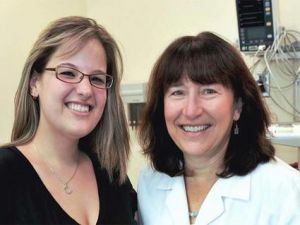Types/aya/zh
Contents
患有癌症的青少年
癌症研究人員,倡導者和癌症倖存者介紹了青春期和年輕成人癌症的話題。
年輕人中的癌症類型
在美國,每年約有70,000年輕人(15至39歲)被診斷出患有癌症,占美國癌症診斷的5%。 這大約是0至14歲兒童被診斷出癌症的六倍。
與成年人或兒童相比,年輕人更有可能被診斷出患有某些癌症,例如霍奇金淋巴瘤,睪丸癌和肉瘤。 但是,特定癌症類型的發生率隨年齡而變化。 在15至24歲的人群中,白血病,淋巴瘤,睪丸癌和甲狀腺癌是最常見的癌症。 在25至39歲之間,乳腺癌和黑色素瘤最為常見。
有證據表明,青少年和年輕人中的某些癌症可能具有獨特的遺傳和生物學特徵。 研究人員正在努力學習更多有關年輕人癌症的生物學知識,以便他們可以鑑定出對這些癌症可能有效的分子靶向療法。
青少年和年輕人(AYAs)中最常見的癌症是:
- 生殖細胞腫瘤
- 顱外生殖細胞腫瘤 (童年)
- 肉瘤
在AYA人群中,癌症是與疾病相關的死亡的主要原因。 在2011年的AYA中,只有事故,自殺和殺人案導致的生命多於癌症。
尋找醫生和醫院
由於年輕人中的癌症很少見,因此必須找到專門治療您所患癌症類型的腫瘤學家。 研究發現,對於某些類型的癌症,如果採用兒科而非成人治療方案,則年輕人可能會有更好的結果。
Young adults who have a cancer that typically occurs in children and adolescents, such as brain tumors, leukemia, osteosarcoma, and Ewing sarcoma, may be treated by a pediatric oncologist. These doctors are often affiliated with a hospital that is a member of the Children’s Oncology Group. However, young adults who have cancers that are more common in adults are often treated by a medical oncologist through hospitals that are affiliated with an NCI-Designated Cancer Center or a clinical research network such as NCTN or NCORP.
了解有關尋找醫生以及如何獲得第二意見的更多信息 尋找醫療保健服務. 當需要做出複雜的醫療決定,有不同的治療方案可供選擇,您患有罕見的癌症或對治療計劃的第一見解來自於沒有其他選擇的醫生時,第二見解可能會特別有用。 專攻或治療許多患有您所患癌症的年輕人。
治療選擇
您所接受的治療類型取決於您所患的癌症類型以及癌症的發展程度(其階段或等級)。 您的年齡,整體健康狀況和個人喜好等因素也很重要。
您的治療選擇可能包括臨床試驗或標準醫療服務。
- 標準醫療(也稱為標準護理)是專家認為適合特定疾病並被接受的治療方法。 從A到Z的癌症清單 了解有關特定類型癌症的治療信息。您還可以了解有關化學療法,免疫療法,放射療法,幹細胞移植,手術和靶向療法等治療方法的信息, 治療類型.
- 臨床試驗也稱為臨床研究,是經過嚴格控制的研究,旨在測試治療癌症等新疾病的新方法。 臨床試驗是通過一系列稱為階段的步驟進行的。 每個階段旨在回答特定的醫學問題。 一旦一種新的治療方法在臨床試驗中被證明是安全有效的,它將成為護理的標準。 您可以獲得常見問題的答案 關於臨床試驗 並搜索有關您患有的癌症類型的臨床試驗。
Fertility Preservation Options
It is important to talk with your doctor about how treatment may affect your fertility. Learn about all of your fertility preservation options and see a fertility specialist before starting treatment. Research has found that although discussions of fertility preservation between doctors and young adult cancer patientsExit Disclaimer are becoming more common, improvements are still needed.
Organizations such as MyOncofertility.org and LIVESTRONG Fertilityalso provide fertility-related support and advice to young adults and health care professionals.
應對與支持
癌症可能會使您與家人和朋友產生孤立感,他們可能不了解您的經歷。 作為一個年輕的成年人,您可能會覺得自己在剛開始獲得獨立時就失去了獨立性。 也許您剛上大學,找到工作或建立了家庭。 癌症診斷使大多數人情緒高昂。 由於癌症在年輕人中相對罕見,因此您可能很少遇到同齡患者。 此外,治療可能需要遠離家鄉住院,這可能導致情緒孤立。 對正常狀態的渴望可能使您無法與健康的同齡人分享您的癌症經歷,從而增加了孤立感。
However, you are not alone. Cancer is treated by a team of experts who address not only the disease but also your emotional and psychological needs. Some hospitals offer comprehensive support programs. Support can come in many forms, including counseling, retreats sponsored by organizations that serve young adults with cancer, and support groups. This support can relieve feelings of isolation and help restore a sense of normalcy.
Young people with cancer say it’s especially helpful to connect with other young people who can offer insights based on their own experiences with cancer.
After Treatment
For many young people, the completion of treatment is something to celebrate. However, this time may also bring new challenges. You may worry that cancer will return or struggle to get used to new routines. Some young people enter this new phase feeling stronger, whereas others are more fragile. Most young people say the transition after treatment took longer and was more challenging than they anticipated. While most of the side effects that you had during treatment will go away, long-term side effects, such as fatigue, may take time to go away. Other side effects, called late effects, may not occur until months or even years after treatment.
Although follow-up care is important for all survivors, it is especially important for young adults. These check-ups can both reassure you and help to prevent and/or treat medical and psychological problems. Some young adults receive follow-up care at the hospital where they were treated, and others see specialists at late effect clinics. Talk with your health care team to learn what follow-up care you should receive and about possible places to receive it.
Two important documents to get written copies of, and to discuss with your doctor, include:
- A treatment summary, with detailed records about your diagnosis and the type(s) of treatment you received.
- A survivorship care plan or follow-up care plan, which addresses both physical and psychological follow-up care that you should receive after cancer treatment. The plan is usually different for each person, depending on the type of cancer and treatment received.
Studies have found that many young adult cancer survivors are often unaware of or underestimate their risk for late effects. Learn more about issues related to survivorship, and questions to ask your doctor, in our follow-up medical care section.
Organizations Serving AYAs
A growing number of organizations serve the needs of AYAs with cancer. Some organizations help young people cope or connect with peers who are going through the same things. Others address topics such as fertility and survivorship. You can also search a range of general emotional, practical, and financial support services in NCI’s list of Organizations That Offer Support Services. You are not alone.
Young Adults
Teens and Adolescents
Coping and Support
Fertility
Survivorship
